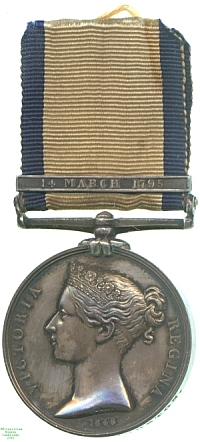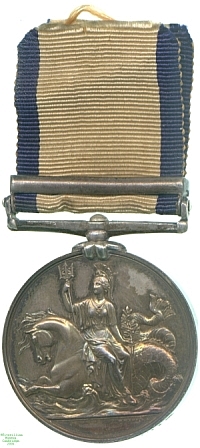
Obverse, a bust of Queen Victoria

Reverse, Britannia with a trident seated sideways on a seahorse

Obverse, a bust of Queen Victoria |

Reverse, Britannia with a trident seated sideways on a seahorse |
Just as in 1848 the extensive land campaigns of the Napoleonic Wars and the other conflicts of the pre-Victorian era were recognised by the issue of the Military General Service Medal, those serving in the Navy at the time were recognised with the Naval General Service Medal. As with the Army equivalent and the East India Company's related award, many of the battles for which the medal was awarded had been fought so long ago that few if any claimants survived.
In addition, bars were awarded for many actions whose significance and size were, despite the heroism displayed by those involved, relatively minor. The result was that many of the bars were issued in tiny numbers, with some combinations all but unique, and the medals command a very high price among collectors because of this rarity and individuality. This in turn, along with the manufacture in most cases of more bars than were eventually issued, has led to the `improvement' of many common awards where recipients' names are shared with those present at `rarer' battles. The medal also shares with the Military General Service and Army of India Medals the oddity that Queen Victoria, whose portrait they bear, was not the ruler under whom the battles for which it was awarded were fought.
The battle that this bar commemorates was fought off Genoa, after two vessels of the French Toulon squadron had collided during a flight from the British Mediterranean Fleet under Admiral Hotham. In the subsequent skirmishing, which included then-Captain Horatio Nelson in HMS Agamemnon as well as his subsequent command HMS Captain, under Captain Samuel Reeve, two French ships were captured by Reeve. The larger context of the fighting was the British control of Corsica, which such successes permitted to continue. A French attempt on Napoleon's birthplace in 1796 however succeeded, whereafter the British lost control of the Mediterranean for some years.
This medal was awarded to Private William Kingston, of the Royal Marine contingent aboard HMS Romulus; the Medal Roll records its award to a William Kingstone. Lester Watson purchased this medal from the dealer Gifford in 1928.